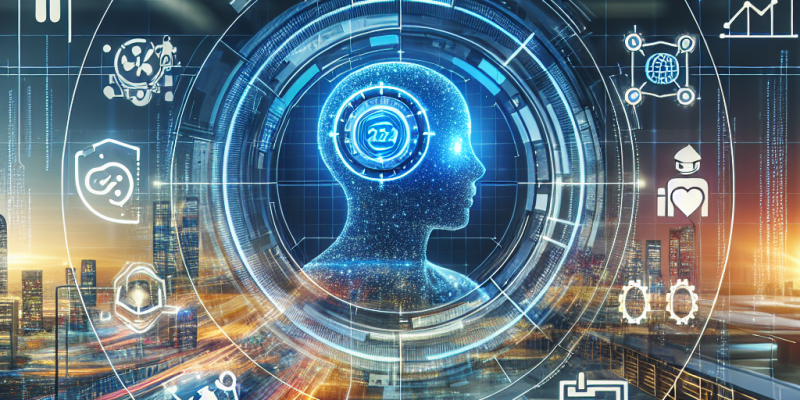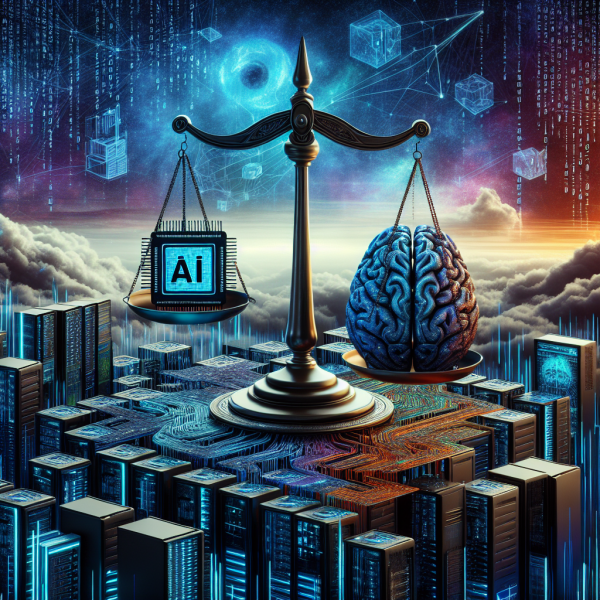AI in 2024: Revolutionizing Industries and Redefining Work

AI in 2024: Revolutionizing Industries and Redefining Work
As we step into 2024, the landscape of artificial intelligence (AI) is transforming industries and reshaping the nature of work in unprecedented ways. Over the past few years, advancements in machine learning, natural language processing, and automation have accelerated, paving the way for AI to become an integral part of daily business operations. This article explores the multifaceted impact of AI across various sectors and the profound changes it brings to the workplace.
Transforming Industries
-
Healthcare Innovation
In 2024, AI is revolutionizing healthcare by enhancing diagnostics, personalizing treatment plans, and streamlining administrative processes. Machine learning algorithms analyze vast amounts of patient data to identify patterns and predict disease outbreaks. AI-powered tools assist healthcare professionals in diagnosing conditions more accurately and quickly, ensuring better patient outcomes. Telemedicine, fueled by AI, offers remote monitoring and consultations, increasing access to care for underserved populations.
-
Manufacturing Efficiency
The manufacturing sector has embraced AI to enhance productivity and reduce costs. Smart factories equipped with AI-powered robots and automation technologies optimize assembly lines, minimizing human error and maximizing efficiency. Predictive maintenance powered by AI analytics helps companies avoid costly downtime by predicting equipment failures before they occur. The shift toward AI-driven supply chain management ensures more agile responses to market demands.
-
Financial Services and Fraud Detection
In 2024, the financial industry leverages AI for risk assessment, fraud detection, and customer service. AI algorithms analyze transaction data in real-time to identify suspicious activities, significantly reducing instances of fraud. Robo-advisors, powered by AI, offer personalized investment advice based on individual client profiles and market trends. This democratizes access to financial planning, enabling more people to navigate their financial futures.
-
Retail Personalization
Retailers are harnessing AI to create personalized shopping experiences. By analyzing consumer behavior and preferences, AI systems allow for personalized marketing strategies and targeted promotions. Chatbots and virtual assistants enhance customer service, handling inquiries and transactions seamlessly. Inventory management systems powered by AI can predict trends, ensuring that stock levels meet consumer demand while minimizing waste.
- Agriculture and Sustainability
Agriculture is witnessing a transformation with AI-driven precision farming techniques. Drones equipped with AI analyze crop health, soil quality, and weather patterns to provide farmers with actionable insights. Machine learning models forecast crop yields, helping to optimize resources and reduce environmental impact. Such innovations are vital for addressing food security challenges in a changing climate.
Redefining Work
The integration of AI into industries is redefining the nature of work itself. While AI promises increased efficiency, it also raises questions about the future of employment. Here, we explore how the workforce is evolving in response to these changes.
-
Collaboration Between Humans and Machines
In 2024, AI is seen not as a replacement for human workers but as a collaborator. Employees across various sectors are leveraging AI tools to augment their skills and capabilities. For instance, data analysts now rely on AI for processing large volumes of information quickly, allowing them to focus on higher-level strategic thinking and decision-making.
-
Upskilling and Reskilling
As AI takes over routine tasks, the demand for skilled workers capable of managing, interpreting, and leveraging AI technology is growing. Companies are prioritizing upskilling and reskilling initiatives to equip their employees with the necessary skills to navigate this new landscape. Training in areas such as data analysis, AI ethics, and human-AI interaction is becoming a cornerstone of professional development.
-
Flexibility and Remote Work
AI technologies facilitate greater flexibility in the workplace. With AI-driven project management tools and collaboration platforms, remote work continues to thrive as teams can work seamlessly from different locations. This shift not only enhances work-life balance but also expands the talent pool, as companies can hire from a global workforce rather than being limited to local talent.
- AI Ethics and Responsibility
As reliance on AI grows, so does the imperative for ethical considerations around its deployment. In 2024, businesses are placing a greater emphasis on responsible AI use, addressing issues such as bias, transparency, and accountability. Organizations are establishing ethical guidelines to ensure that AI systems enhance decision-making without compromising fairness or integrity.
Conclusion
AI in 2024 is a formidable force driving innovation across industries and reshaping the very fabric of work. From healthcare to finance and agriculture, the implications of AI are profound and far-reaching. While the rise of AI presents challenges, such as workforce displacement and ethical dilemmas, it also offers immense opportunities for growth, creativity, and efficiency. As we navigate this new era, the collaborative partnership between humans and AI will be crucial in shaping a future that harnesses technology’s power for the benefit of all. The key to success lies in adaptability, continuous learning, and a commitment to ethical practices as we unlock the full potential of AI in the years to come.














